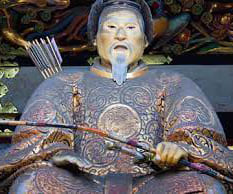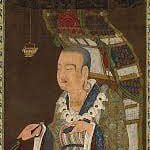Explore the life and contributions of Sorai Ogyu, a prominent Japanese Confucian scholar, in this comprehensive biography. Learn about his philosophy, impact on Edo period intellectual thought, and lasting legacy in Japanese history.
Sorai Ogyu | Brief Biography
Sorai Ogyu (1666-1728) was a prominent Japanese thinker, scholar, and writer of the Edo period. He is considered one of the most important figures in the development of the Nativism (kokugaku) movement in Japan, and his ideas have had a lasting impact on Japanese culture and intellectual life.
Ogyu was born in 1666 in the Edo (modern-day Tokyo) area, the son of a lower-ranking samurai. Despite his relatively humble origins, he showed a talent for learning from a young age, and he went on to study a wide range of subjects, including classical Chinese literature, Confucianism, and Japanese classical literature.
In his early twenties, Sorai Ogyu became a disciple of the Confucian scholar Kinoshita Jun’an, who was one of the leading intellectuals of the time. Under Jun’an’s tutelage, Ogyu developed a deep appreciation for Confucian thought, and he went on to become one of the leading Confucian scholars of his era.
However, despite his admiration for Confucianism, Sorai Ogyu also became interested in the Nativism movement, which was emerging in Japan at the time. Nativism sought to reclaim Japan’s cultural and intellectual heritage, which was thought to have been lost due to centuries of cultural and political domination by China. Sorai Ogyu saw in Nativism an opportunity to rediscover and reinvigorate Japan’s own unique traditions and values, and he began to write and speak on the subject.
Ogyu’s ideas and writings had a profound impact on Japanese intellectual life. He was a major figure in the Nativism movement, and his works helped to shape the movement’s philosophy and goals. In particular, Ogyu is remembered for his ideas about the importance of Japan’s own classical literature and traditions, and for his belief in the superiority of Japanese culture over Chinese culture.
In addition to his writings on Nativism, Ogyu is also remembered for his contributions to Confucian thought. He was one of the first scholars in Japan to write about Confucianism in the Japanese language, and his works helped to introduce Confucianism to a wider audience in Japan. He also wrote extensively on the subjects of ethics and government, and his ideas on these subjects had a lasting impact on Japanese political thought.
Ogyu died in 1728 at the age of 62, but his legacy lived on. His ideas and writings continued to be widely read and studied in Japan, and he is remembered today as one of the most important figures in the development of Japanese thought and culture.
In conclusion, Sorai Ogyu was a towering figure in Japanese intellectual history, and his ideas and writings continue to be of great interest and importance to scholars and students of Japanese culture and thought. His contributions to Nativism, Confucianism, and Japanese political thought have had a lasting impact on Japanese culture and society, and his legacy lives on to this day. 0 0 0.
Sorai Ogyu: Comprehensive Biography
Introduction
Sorai Ogyu (1666–1728) was a renowned Japanese Confucian scholar, philosopher, and historian during the Edo period. He is best known for his reformist ideas that challenged the dominant philosophical schools of his time, including Neo-Confucianism, which had been widely accepted in Japan. His work deeply influenced Japanese intellectual thought, especially in the realms of government, education, and ethics. Sorai’s teachings emphasized a return to classical Confucian ideals, setting him apart as a leading figure in the development of Edo-period Confucianism.
Early Life and Education
Born in Edo (modern-day Tokyo) in 1666, Sorai was the son of Ogyu Naotsugu, a physician who served the shogunate. Coming from a scholarly family, Sorai was introduced to classical Chinese literature and Confucian teachings at an early age. His father’s position provided him with access to a rich intellectual environment, where he honed his interest in Confucian philosophy.
Sorai’s early education was influenced by the then-dominant Zhu Xi school of Neo-Confucianism, which had been imported from China. However, Sorai found this philosophy insufficient in addressing the needs of Japanese society. His search for more profound wisdom led him to study the original texts of Confucius and Mencius, distancing himself from the interpretations of Zhu Xi.
Career and Philosophical Breakthrough
In his twenties, Sorai served as a tutor to Yanagisawa Yoshiyasu, an influential daimyo, which provided him with a platform to further his intellectual pursuits. During this period, Sorai began developing his ideas that departed from Zhu Xi’s moralistic interpretation of Confucianism. His dissatisfaction with neo-Confucianism grew stronger as he felt that it had become overly abstract and disconnected from real-life governance.
Sorai argued for a return to the Confucian classics, particularly the ancient texts written by Confucius himself and the rites and music of the Zhou dynasty, which he believed held the true essence of Confucian teachings. His philosophy was based on the idea that governance and moral principles should be grounded in the historical traditions of ancient China, rather than in speculative metaphysics.
Sorai’s Major Works
1. Bendō (On the True Way, 1709) – In this work, Sorai laid out his critique of Neo-Confucianism and emphasized the importance of studying the classical texts directly. He argued that Zhu Xi’s interpretations had distorted Confucius’ original ideas.
2. Benmei (Distinguishing Names, 1717) – This book focuses on linguistic analysis and the importance of understanding the proper meanings of classical Chinese terms. Sorai believed that clarity in language was essential for moral and political thought.
3. Seidan (Political Discourse, 1724) – In this text, Sorai offered concrete political and economic advice for the Tokugawa shogunate, advocating for reforms that would strengthen the government and promote societal stability.
These works solidified Sorai’s reputation as one of the foremost intellectuals of his time, and his ideas were widely discussed and debated among scholars.
Philosophy
Sorai Ogyu’s philosophy can be categorized as a revival of classical Confucianism, focused on the practical application of Confucian ideals in governance and social life. His thought was a reaction to what he saw as the rigid, abstract nature of Neo-Confucianism, which had become the dominant ideology in Japan.
1. Return to the Classics: Sorai believed that the key to solving contemporary political and social issues lay in the careful study of ancient Confucian texts, especially those from the Zhou dynasty. He argued that by understanding and applying the principles of governance from these texts, rulers could ensure a stable and just society.
2. Focus on Rites and Music: Sorai emphasized the importance of rituals (rites) and music as key aspects of a well-ordered society. He believed that rites were not merely ceremonial but were essential in maintaining social harmony and reflecting the moral order. Similarly, music had a powerful influence on emotions and could cultivate virtue in individuals.
3. Anti-Moralism: Sorai criticized the moralistic approach of Neo-Confucianism, which placed a heavy emphasis on individual self-cultivation and personal virtue. Instead, Sorai argued that governance should focus on concrete actions and policies that promote public welfare, rather than abstract moral principles.
4. Language and Governance: In “Benmei,” Sorai highlighted the importance of language in shaping thought and policy. He believed that by studying the original meanings of terms in classical Chinese texts, scholars and rulers could gain a clearer understanding of Confucian principles, leading to better governance.
Influence on Japanese Thought
Sorai’s ideas were revolutionary in the Edo period, as they challenged the entrenched authority of Neo-Confucianism and the Tokugawa shogunate’s reliance on it. His call for a return to classical Confucianism resonated with many scholars and officials who were dissatisfied with the moral and political decline they perceived in Japanese society.
Though Sorai’s immediate influence on government policy was limited, his ideas had a lasting impact on later generations of scholars. His emphasis on historical and textual analysis laid the groundwork for future schools of thought, such as the Kokugaku (National Learning) movement, which sought to rediscover Japan’s own ancient traditions, independent of Chinese influences.
Later Life and Death
In his later years, Sorai continued to teach and write, gaining a reputation as one of the leading intellectuals in Japan. His followers, known as the “Sorai School,” carried on his ideas and further developed his critiques of Neo-Confucianism.
Sorai passed away in 1728 at the age of 62, but his influence continued to be felt long after his death. His works remained influential among Edo-period scholars, and his critiques of abstract moralism and advocacy for practical governance continue to be studied by historians and philosophers today.
Legacy
Sorai Ogyu’s legacy is that of a reformer and intellectual giant who sought to reshape Japanese Confucianism by returning to its classical roots. His rejection of Neo-Confucian orthodoxy and emphasis on practical governance left a profound mark on Japanese intellectual history. Sorai’s ideas not only challenged the dominant philosophies of his time but also helped shape the future of Japanese thought by encouraging a deeper engagement with historical texts and a more pragmatic approach to political and social issues.
Though not without controversy, Sorai’s philosophy represented a turning point in Edo-period Confucianism and laid the foundation for new intellectual currents that would emerge in Japan in the centuries to come.
Conclusion
Sorai Ogyu’s life and work illustrate the power of intellectual dissent in shaping the course of history. By challenging the prevailing orthodoxy and advocating for a return to the original Confucian texts, Sorai revitalized Japanese Confucianism and left an enduring legacy in the fields of philosophy, politics, and education. His contributions to Japanese thought are still studied today, reminding us of the lasting influence of a scholar committed to understanding and applying the wisdom of the past.
Sorai Ogyu: Facts in Brief
Who was Sorai Ogyu?
Sorai Ogyu (1666–1728) was a prominent Japanese Confucian scholar, philosopher, and historian during the Edo period. He is best known for his reformist views that emphasized a return to the classical Confucian texts and critiqued the dominant Neo-Confucianism of his time.
What is Sorai Ogyu best known for?
Sorai Ogyu is best known for advocating a revival of classical Confucianism, focusing on the original teachings of Confucius and ancient Chinese governance. He also emphasized the importance of clear language, rituals, and music in social harmony, and offered practical political reforms for Japan.
What are Sorai Ogyu’s key works?
His major works include:
- Bendō (On the True Way, 1709) – A critique of Neo-Confucianism and a call to return to classical Confucian texts.
- Benmei (Distinguishing Names, 1717) – Focused on the precise meaning of words in Confucian texts.
- Seidan (Political Discourse, 1724) – A treatise on political reforms and practical governance.
What was Sorai Ogyu’s critique of Neo-Confucianism?
Sorai criticized Neo-Confucianism for being overly moralistic and speculative, arguing that it distorted Confucius’ original teachings. He believed that the focus on personal morality and metaphysics distracted from practical governance and societal reform.
What did Sorai Ogyu advocate for in terms of governance?
Sorai Ogyu advocated for a return to the political and moral systems found in ancient Chinese texts, such as the rites and music of the Zhou dynasty. He believed that by studying and applying these classical principles, Japan could ensure a more stable and just society.
What is Sorai Ogyu’s view on the importance of language?
In his work ‘Benmei’, Sorai stressed the importance of understanding the correct meanings of classical Chinese terms in Confucian texts. He argued that clarity in language was crucial for effective governance and philosophical reasoning.
How did Sorai Ogyu’s philosophy differ from other Confucian scholars of his time?
Sorai differed from other Confucian scholars by rejecting the dominant Neo-Confucian interpretation, which focused on moral and metaphysical theories. Instead, he emphasized the importance of practical governance, historical study, and linguistic clarity, basing his philosophy on classical Confucianism.
How did Sorai Ogyu influence Japanese thought?
Sorai Ogyu’s ideas deeply influenced Japanese intellectuals during and after the Edo period. His focus on practical governance, historical analysis, and criticism of abstract moralism influenced later movements like Kokugaku (National Learning), which sought to rediscover Japan’s native traditions.
Who were Sorai Ogyu’s followers?
Sorai’s followers were known as the “Sorai School.” These scholars further developed his critiques of Neo-Confucianism and promoted his ideas about returning to classical texts and practical governance.
What is Sorai Ogyu’s legacy?
Sorai Ogyu’s legacy is one of intellectual reform and innovation. He reshaped Japanese Confucianism by challenging Neo-Confucian orthodoxy, emphasizing a return to classical Confucian texts, and advocating for practical, effective governance. His work remains influential in the study of Japanese philosophy and history today.
Sorai Ogyu: Facts in Brief
Sorai Ogyu: Life
- Full Name: Ogyu Sorai (荻生 徂徠)
- Birth: March 21, 1666, Edo (modern-day Tokyo), Japan
- Death: February 28, 1728, Edo, Japan
- Era: Edo Period (1603–1868)
- Occupation: Confucian scholar, philosopher, historian, tutor
- Philosophical Focus: Classical Confucianism, political reform, language, rites, and music
Key Contributions:
- Advocated a return to classical Confucian texts over Neo-Confucian interpretations.
- Emphasized the importance of rituals (rites) and music for social harmony.
- Criticized the moralistic approach of Neo-Confucianism, focusing instead on practical governance.
- Highlighted the significance of language clarity for governance.
Major Works:
- Bendō (On the True Way, 1709)
- Benmei (Distinguishing Names, 1717)
- Seidan (Political Discourse, 1724)
Influence: Pioneered a reformist movement in Japanese Confucian thought, influencing Edo-period intellectuals and laying the groundwork for later schools like Kokugaku (National Learning).
Legacy: Known for his critiques of abstract moralism and advocacy for practical governance, Sorai remains a key figure in the study of Japanese Confucianism and Edo-period philosophy.
N.B. If you like the article please share your thoughts and feelings with us.
N. B. This article originally belongs to the book, ‘Brief Biographies of Ancient Thinkers and Writers‘ by Menonim Menonimus.
Books of Biography by M. Menonimus:
- The World Writers-Brief Biographies
- Introduction to World Writers
- Introduction to World Personalities
- Love of Reputed Persons ..
Additional Searches:











